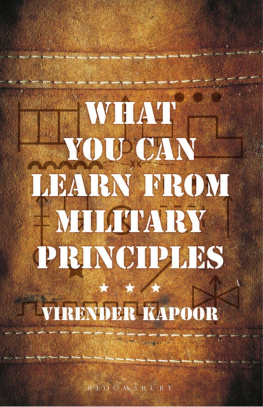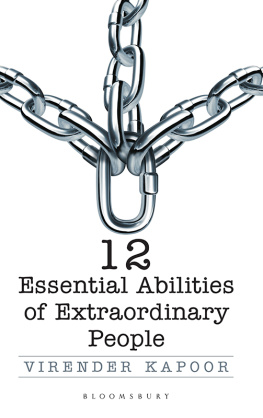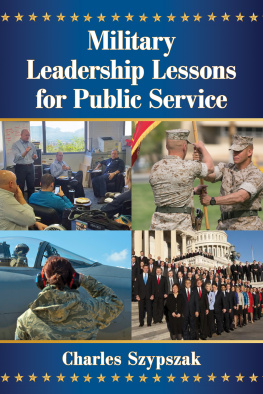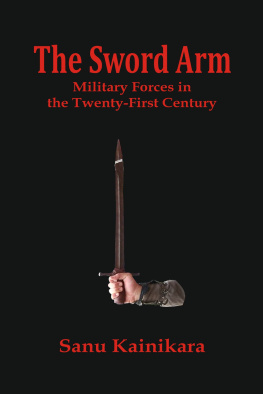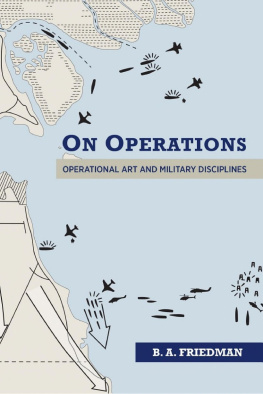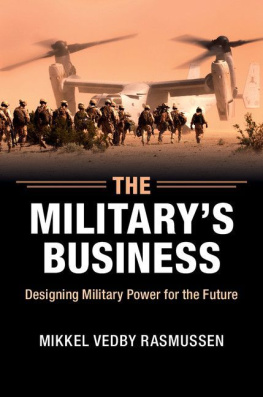Content

WHAT YOU CAN LEARN FROM
MILITARY PRINCIPLES
WHAT YOU CAN LEARN
FROM MILITARY
PRINCIPLES
Virender Kapoor

First published in India 2017
2017 by Virender Kapoor
All rights reserved. No part of this publication may be reproduced or transmitted in any form or by any means, electronic or mechanical, including photocopying, recording, or any information storage or retrieval system, without prior permission in writing from the publishers.
No responsibility for loss caused to any individual or organization acting on or refraining from action as a result of the material in this publication can be accepted by Bloomsbury or the author.
The content of this book is the sole expression and opinion of its author, and not of the publisher. The publisher in no manner is liable for any opinion or views expressed by the author. While best efforts have been made in preparing this book, the publisher makes no representations or warranties of any kind and assumes no liabilities of any kind with respect to the accuracy or completeness of the content and specifically disclaims any implied warranties of merchantability or fitness of use for a particular purpose.
The publisher believes that the content of this book does not violate any existing copyright/intellectual property of others in any manner whatsoever. However, in case any source has not been duly attributed, the publisher may be notified in writing for necessary action.
BLOOMSBURY and the Diana logo are trademarks of Bloomsbury Publishing Plc
E-ISBN: 978 93 86349 569
2 4 6 8 10 9 7 5 3 1
Bloomsbury Publishing India Pvt. Ltd
Second Floor, LSC Building No.4
DDA Complex, Pocket C 6 & 7, Vasant Kunj
New Delhi 110070
www.bloomsbury.com
Created by Manipal Digital Systems.
To find out more about our authors and books visit www.bloomsbury.com. Here you will find extracts, author interviews, details of forthcoming events and the option to sign up for our newsletters.
The safety, honor and welfare of your country come first, always and every time.
The honor, welfare and comfort of the men you command come next.
Your own ease, comfort and safety come last, always and every time
Field Marshal Chetwode
WHAT YOU CAN LEARN FROM MILITARY PRINCIPLES
Several management principles have either been evolved or are a derivative of practices followed by the armed forces across the world. Areas like leadership, inventory management, organizational behavior, organizational structure, project management, team work and stress management, have possibly benefitted the most from the military practices which have withstood the test of time in different cultures, locations and circumstances. These methods practiced over hundreds of years, were used successfully under the most trying circumstances and possibly learnt at a heavy price during military operations in which millions perished. That is the reason why these have been adopted whole heartedly by the management science and are being used effectively as models of excellence.
The Art of war by Sun Tzu written about 500 B.C. is not only seen as a guide to the modern military doctrines and strategic thought of military leaders of today, but it has also been cleverly adapted by business leadership throughout the world. Twenty five centuries after its preparation, it still remains a valuable piece of literature for conduct the war. Sun Tzu talks more of strategy and broad principles which form the basis of conducting warfare. Though the horses and spears have been replaced by tanks, aircraft and powerful weapons including nuclear weapons, Sun Tzus teachings still remain relevant because he deals with fundamentals detailing how warfare is influenced by human behavior, politics and compulsions of a nation state. The International relations have gone through a sea change today but these basic foundation stones can still be easily adapted even in this complex global environment by a head of the state, a general, a diplomat, a business honcho, a manager or a person in politics operating at a strategic level.
Having read the art of war I started to ponder over the idea that there are several military terms and practices which are meant for operational purposes both at strategic as well as tactical level and merit attention. These have not been addressed by Sun Tzu at all, as his work deals only with strategy and broad principles. These principles were enumerated by him when there was no management science and very little technological or scientific inventions. These therefore are the very basic ideas bordering on military philosophy that would be applicable across the time continuum.
Most of these military terminologies that I am talking about are terms to define a military action/ process to accomplish a particular task or to be used in a particular military operational scenario. These have gradually evolved over centuries of warfare but have been adapted as well as modified over and over again in time according to the modernization of weapon systems, changing international power equations, geopolitics and changing warfare scenario. These are so well developed ideas and methods that they can be well adapted and mapped into any complex civilian scenario- business or otherwise. These can also be seen as time tested operational principles which we have a lot to learn from.
Applied Technology as well pure sciences have also greatly benefited from warfare over the centuries. This happened because every country was investing a substantial amount of their annual budgets in creating military edge over their adversaries for their security which is paramount for the national interest. Eventually it benefitted them as they could recycle the same cutting edge technology by adapting it for civilian use. Popularly known as Dual Use Technology which could be used for both peaceful commercial as well as military applications - it impacted nuclear power generation, missile and space missions, Telecommunications, Applied electronics, Chemical industry, Automobiles, all branches of engineering and medical science. These technological feats and accomplishments were well woven into military management practices which had force multiplication affect on outcome of military operations.
My idea of writing this book is to explore each one of these strategic as well as tactical operational processes, principles, methods, and examining its core value which can be applied across a broad spectrum of situations in our daily lives as well as for our business methods. I have studied these over a period of time and I am convinced that this work can also become a very meaningful manual for business strategy and tactics.
Each chapter first explains the basic concept and then maps it into actual military operations taken from over the last century to illustrate the expanse of its application in different and widely divergent situations. Each chapter thereafter briefly examines the application of that sole principle in our daily life as well as business, work wherever applicable.
This book has a rich content which is a fine amalgamation of various disciplines like contemporary history, Science and Technology, Management science, Engineering, Psychology, Information Technology, Telematics, Leadership, Motivation, Human Resource Management, Management Economics, Military History, Strategy and tactics, Weaponry, Geography, Geopolitics, International Relations, Diplomacy and Political Science.

